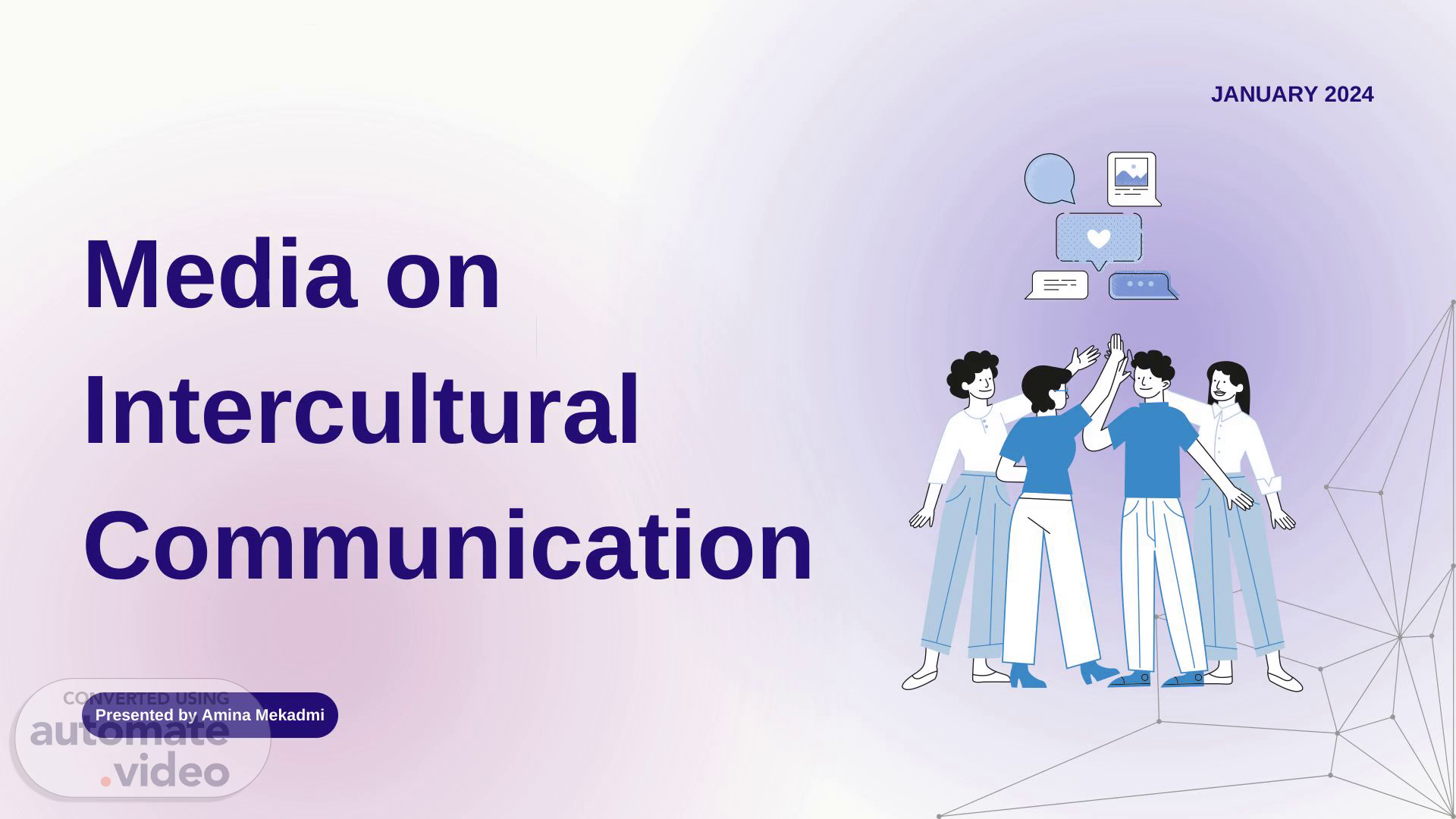
Theoretical Background
Scene 1 (0s)
Media on Intercultural Communication Presented by Amina Mekadmi JANUARY 2024.
Scene 2 (6s)
01. Introduction TABLE of contents 02. Theoretical Background 03. Methodology 05. Conclusion 04. Findings.
Scene 3 (14s)
Introduction “In a world marked by connectivity and global interaction, the interplay between media and intercultural communication becomes paramount.” Central Study Issue: "How does media affect and shape cross-cultural communication in our globalized society?" Objective: Examine the multifaceted relationship between media and intercultural communication, analyzing its function in bridging cultures, and addressing challenges presented by cultural differences..
Scene 4 (31s)
2 New media is driving global changes, impacting daily life, business, and society by introducing features like digitality, convergence, and interactivity. Theoretical Background 1 Human communication has evolved from oral traditions to digital media. Now, because of technology, people from different places can easily share and communicate globally. 4 High-/ & Low-Context Culture Hofstede's cultural dimensions 3 Defining Intercultural Communication Evolution of Media Globalisation Intercultural Communication Frameworks Intercultural communication: navigating differences, fostering understanding, and embracing diverse perspectives..
Scene 5 (52s)
Sources finding information on how to culturally adapt and communicate interculturaly succesfully searching for studies on media in the context of intercultural communication. Research METHODOLOGY The term paper was conducted mainly on Journals and conference articles..
Scene 6 (1m 4s)
Media, Globalisation & Intercultural Communication Intercultural Adaptation & Challenges Media as a bridge to intercultural communication Findings.
Scene 7 (1m 11s)
Media, Globalisation & Intercultural Communication The internet, or new media, significantly changes how we communicate globally. Language adapts to brief and immediate expressions, reflecting the impact of networking..
Scene 8 (1m 22s)
Global cultures are interconnected in a way which frequently encourages intercultural adaption among people. Lysgaard's four stages—honeymoon, crisis, adjustment, and biculturalism—provide insights into the psychological dimensions of intercultural adaptation. Successfully adjusting to intercultural conversations on social media involves understanding cultural nuances and adapting communication patterns. Intercultural Adaptation & Challenges.
Scene 9 (1m 37s)
In interactions, people bring cultural peculiarities, historical tales, and individual experiences, both in-person and virtually. It becomes crucial to foster respect and tolerance between people in addition to having a common language. Intercultural Adaptation & Challenges.
Scene 10 (1m 50s)
How does social media serve as a strong bridge between different cultures? Through social media online communities with different cultures are formed . Social Media promotes intercultural communication by providing insights into people's lives, viewpoints, and world events. Media as a bridge to intercultural communication.
Scene 11 (2m 3s)
Conclusion Key Takeaways: Media Evolution: The evolution of media has significantly shaped intercultural communication in our dynamic society. Transformation: Media has not only enabled but completely transformed the creation and dissemination of information, fostering rare cross-cultural exchanges. Globalization and Communication: Globalization and media's impact on communication are intertwined, influencing cultural and economic perspectives. Adaptability in Communication: Effective communication, especially on social media, relies on intercultural adaptability and an awareness of cultural complexities..
Scene 12 (2m 24s)
Conclusion Challenges & Opportunities: Cross-Cultural Adaptation: The four stages of adaptation highlight the psychological landscape individuals navigate during cross-cultural encounters. Complexity: While international communication has advantages, linguistic and cultural differences can pose challenges. Media as a Powerful Medium: Social media, in particular, becomes a powerful medium for cross-cultural exchanges, promoting international connections and common experiences..
Scene 13 (2m 42s)
Thank you for your attention. Presented by Amina Mekadmi JANUARY 2024.